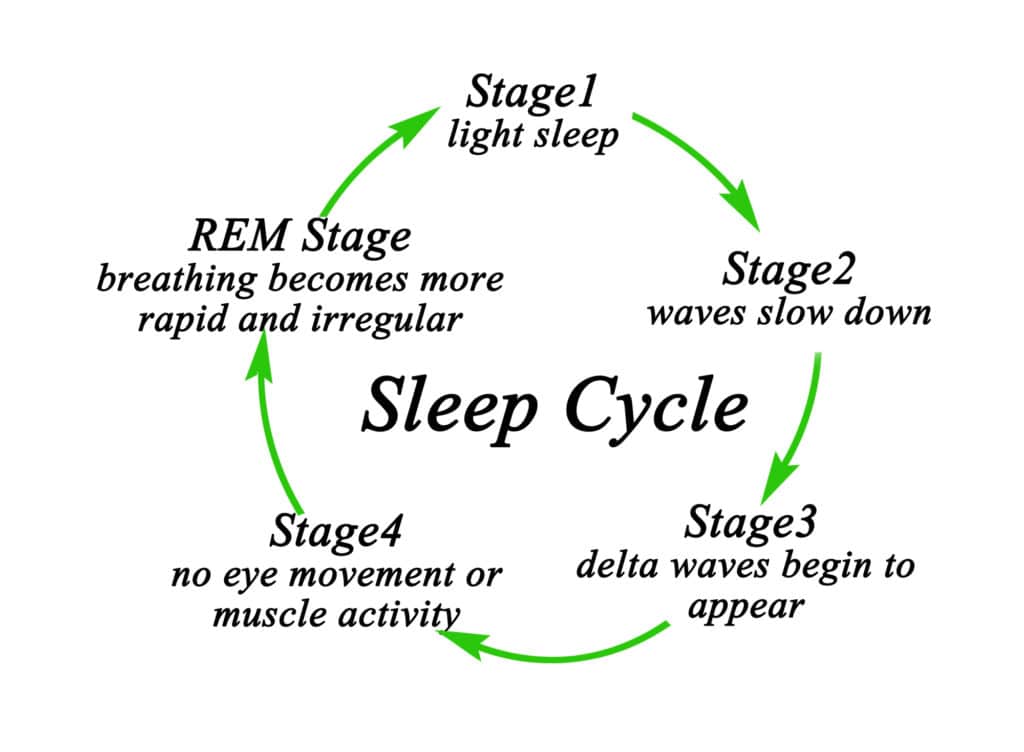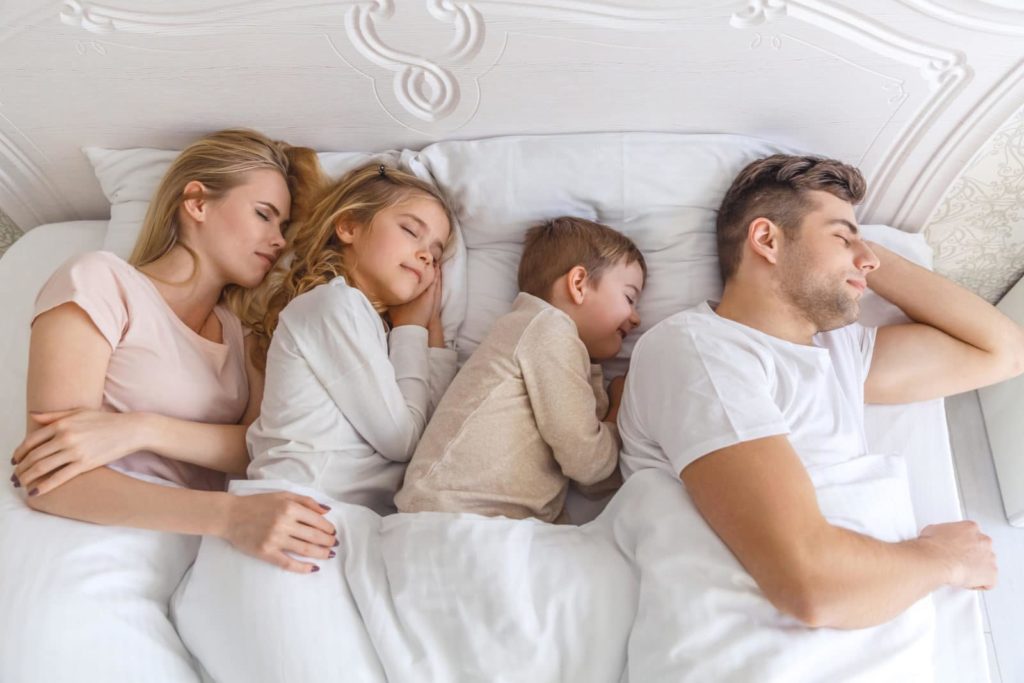The quality of sleep you experience is just as important as the amount of time you spend asleep. While you may be getting the recommended 7-9 hours of sleep per night, if you are not getting enough deep sleep, then you will not feel fully rested in the morning. During deep sleep, your brainwaves slow down. It allows you to completely rest and recuperate overnight, making it essential for healthy, restorative sleep. Today we will discuss how to get more deep sleep and tackle the questions:
- Are you getting enough deep sleep?
- What is deep sleep called by professionals?
- What are the benefits of deep sleep?
Continue reading to find out more about deep sleep and what makes it so important for everyday health!
What is Deep Sleep?
Deep sleep is the third stage of the sleep cycle. It can also be referred to as delta sleep or slow-wave sleep because this is when your brain activity is at its lowest. Brainwaves on an EEG scanner produce slow-waves with a high amplitude and a low frequency during this stage of sleep. Your heartbeat and breathing also reach their slowest point while in deep sleep allowing your muscles to completely relax.
If you are wondering how to tell if someone is in deep sleep, there are a few signals you can look for. First, it is much harder to wake someone in this stage of sleep. Often, loud noises will not even have an effect on their state of sleep. Second, there will be very slow eye movement to none at all, unlike other stages of sleep. Third, they will stay in one position. Of course, this takes some prolonged observation.
What are the Other Stages of Sleep?
There are 5 stages of sleep. However, stages three and four which is where we get deep sleep are generally grouped together and recognized as one. All five can be divided into main categories: REM sleep and non-REM sleep. Stages 1, 2, 3, and 4 are all considered subcategories of non-REM sleep. Stage 5 is the only stage of REM sleep.

Stage 1
This is the period when you transition from being awake to being asleep. This only lasts a few minutes while your body functions start to slow down and rest. Your muscles start relaxing and occasional twitching is sometimes experienced.
Stage 2
This comprises about 50% of your total sleep cycle. As your body continues to relax, your core temperature starts to drop and your brainwaves begin to slow while still having bursts of increased activity.
Stages 3 and 4
We already covered the basics of deep sleep above. An additional thing to note is that your first deep sleep lasts around 45 to 90 minutes. As the night progresses the duration of your deep sleep cycle will slowly become shorter and shorter.
Stage 5
This is called REM sleep. During this, you experience rapid eye movement, hence the name. Your brain activity and heartbeat increase causing you to dream. Breathing also speeds up and can even become irregular at times. This is also when your limbs may become paralyzed restricting any and all motion.
Why is Deep Sleep Important?
There are several benefits of deep sleep, especially for growing children and teens. Deep sleep promotes physical growth and development. During the first deep sleep of the night, human growth hormone is released. As you age, this diminishes but other benefits remain.
Essential Functions of Deep Sleep
- Deep sleep gives your brain time to consolidate new memories. Without this, you will function on a lower cognitive level and will have issues remembering things the following day. As a result of getting insufficient amounts of deep sleep, people can suffer from different types of insomnia.
- Cell regeneration occurs. Healing and repair of strained and sore muscles happen, as well as other types of cell regeneration that keep you looking rested and rejuvenated. This is where the term “beauty sleep” originated.
- Your immune system is also strengthened during periods of deep sleep. You are more likely to be healthy when you allow your body time to fully refresh. Adversely, lack of deep sleep compromises your immune system making it more likely that you will become sick.
How Much Deep Sleep Do You Need?
By now you are probably wondering about the answer to this question. Generally, around 75% of a full night of sleep is spent in non-REM sleep and the other 25% is spent in REM sleep. Only about 13 to 23% of your total night of sleep is spent in deep sleep.

The amount of deep sleep you need, and actually get, varies with age. Children and teens who are still actively growing tend to need more deep sleep for the adequate release of human growth hormone.
As you age, the amount of deep sleep you get diminishes. Typically, a person in their 20s will get 20% out of a total night’s sleep. A person in their 40s or 50s typically only gets about 10% deep sleep. Once you reach your 70s and 80s deep sleep can decrease to as little as 5 or 2%.
The decrease in deep sleep with age contributes to signs of aging like weakness, feeling less refreshed after a night of sleep, prolonged healing times, and diminishing mental acuity.
Interestingly, your body will naturally counterbalance sleep deprivation with additional deep sleep in the next sleep cycle. If you miss some or even an entire night of sleep, the next time you sleep, you will have a higher percentage of deep sleep overall. Your body recognizes how important deep sleep is and reacts accordingly when you are sleep deprived.
A Guide to Getting Better Overall Sleep
In our fast-paced world, it can often be difficult to wind down and relax before bedtime. Unfortunately, this can have a negative effect on your quality of sleep. In order to combat this common problem, here are some easy tips that will show you how to get more deep sleep.
1. Get a full night of sleep every night.
The most important thing you can do to ensure you are getting enough deep sleep is prioritizing getting a full night of sleep every night. For most adults, this is anywhere from 7 to 10 hours each night. Getting a full night of sleep gives your body enough time to cycle through the sleep stages adequately so you can wake up feeling refreshed.
2. Take a hot bath or sit in a sauna.
Studies have shown that heat can be associated with promoting more deep sleep. Sitting in a sauna, hot tub, or simply taking a hot bath before bedtime can not only relax you and your muscles, but it can also increase the amount of deep sleep you get.

3. Eat a low carbohydrate diet.
Eating a low carb diet has been known to increase periods of deep sleep and REM sleep for some individuals. It is speculated that this is a result of the way your body metabolizes fat content differently from the way it would carbohydrates.
4. Make a sleep schedule.
Try to fall asleep and wake up at the same time every day and do your best to follow through. I know this can be especially hard on the weekends but try to stick with it because it will help your body sync its internal clock to your sleep schedule. After a short period, you will be able to fall asleep faster and maximize your sleep time overall.
5. Avoid naps during the day.
Naps can be very beneficial for a lot of people, but not if you have trouble sleeping at night. A nap in the afternoon can make you feel more energized after but can also prevent you from falling asleep at night. Avoid napping to maximize sleep benefits at night. The more tired you are, the more soundly you will sleep.
6. Exercise every day.
Daily exercise provides you with a long list of health benefits, one of which is improved sleep. As we just mentioned, the more exhausted you are, the harder you will sleep. Your body will facilitate better quality sleep so it can repair your sore and strained muscles. Vigorous daily exercise has been linked with promoting more deep sleep as well as increasing the quality of sleep overall. This may be caused by your body heating up, which we mentioned before has been associated with deep sleep.
7. Melatonin and Deep Sleep
Melatonin is a hormone produced by the brain that resets your body’s sleep-wake cycle. You can increase your melatonin by eating certain foods like bananas, kiwis, walnuts, almonds, and tart cherries. Melatonin helps you fall asleep faster and in some cases stay asleep for longer than normal. Melatonin has been linked to increasing deep sleep as well as REM sleep.
8. Assess your sleep environment.
Your bedroom’s atmosphere contributes to your ability to relax as well. Make sure there is an option for the absence of light and noise while you sleep. Also control the temperature by setting it between 60 and 67 degrees. You may want to try adding noise machines, a fan, or a humidifier if you find white noise soothing. Plants can also improve the air quality and add to the calming feel of your room overall. Some essential oils have also been recognized for their calming effects, like lavender, and can be used in a diffuser to further improve air quality in your room.
9. Give yourself the right tools for maximum comfort.
The right mattress and the right pillow can make a huge difference when it comes to your quality of sleep. The wrong type or a worn out pillow or mattress can cause discomfort while you sleep. This, in turn, causes you to be restless and change positions frequently resulting in poor sleep quality. Make sure you are comfortable and supported by both the type of pillow and the type of mattress you use to ensure maximum benefits. Top it up with a super quality bed covers like those made with Egyptian cotton and you can sleep like a baby.
10. Avoid caffeine, alcohol, and cigarettes before bedtime.
I know avoiding caffeine seems pretty obvious but try to abstain in the afternoon if you are having trouble falling asleep. Both alcohol and cigarettes are stimulants as well and should be avoided for at least an hour before bedtime, better if longer.
11. Avoid eating a heavy meal before bedtime.
When sleeping after eating, especially eating a large meal before bedtime, the energy that should be used for restoring your body as you sleep diverts to your digestive system. The result is a less restful sleep. Try to avoid eating a large meal 2 to 3 hours before you expect to go to sleep. Some people find that spicy food can also disrupt their sleep because it gives them indigestion.
12. Establish a sleep routine or ritual.
Practice a specific relaxing activity before bedtime every night. Eventually, your body will recognize the activity as a pre-bedtime ritual and start preparing for sleep naturally. Reading is a great option but if you prefer something smaller, just try washing your face.

13. Optimize your circadian rhythm through the use of appropriate lighting.
A natural way to promote your circadian rhythm is by exposing yourself to bright light, like sunlight, in the morning when you wake up. This gives you a kick start that helps wake you up quick. Adversely, keep lights dim in the evening. Avoiding bright light will help your body recognize that the time for sleep is approaching.
14. Avoid electronics before bedtime.
The backlit screen on your phone and laptop can be too bright when you are getting ready for bedtime. Turn the screen’s brightness down if you cannot avoid your electronics for at least an hour before bedtime. However, not using them or the television could help you fall asleep faster at night if you are having trouble. You could also use an app like flux for Mac and PC which reduces the blue light of your computer.
15. Only use your bed for sleeping and sex.
When you eliminate all activities other than sleeping and sex from your bed it alerts your body to what it should be doing in bed, sleeping. Avoid doing work or watching television in your bed so you only associate your bedroom with sleeping.
16. Don’t forget, you can always ask a professional for help.
If none of these options are working for you and you still can’t figure out how to get deep sleep naturally, don’t hesitate to ask a professional for help.
Sleep Your Way to a More Productive Day
Now that you know what deep sleep is and why it is so important, how to get more deep sleep depends on your personal level of input. There are many ways you can promote getting more deep sleep and it’s up to you to make sure you do so in a way that helps your overall health. Start focusing on the benefits of deep sleep and your total quality of sleep today so you can wake up feeling more refreshed and alert on a daily basis.
Additional Resources
- Sleeping With Socks On
- Biphasic Sleep And Polyphasic Sleep
- Essential Oils For Sleep
- Sleeping on the Couch






